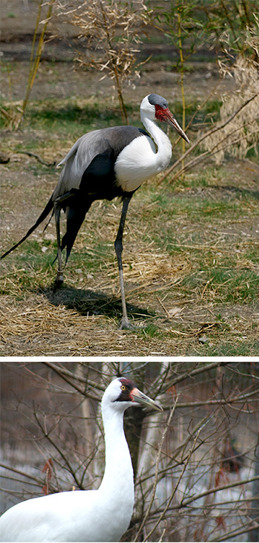Zoo New England moves birds indoors due to Avian Influenza concerns
Thursday March 17, 2022
 For the health and safety of many of the bird species at Zoo New England’s Franklin Park Zoo and Stone Zoo, staff has relocated many of the birds to indoor spaces to protect them from the avian influenza.
For the health and safety of many of the bird species at Zoo New England’s Franklin Park Zoo and Stone Zoo, staff has relocated many of the birds to indoor spaces to protect them from the avian influenza.
Highly Pathogenic Avian Influenza (HPAI) has been confirmed in states within the eastern flyway, including Massachusetts, as well as in the Midwest. Wild waterbirds, including shorebirds and waterfowl, are most likely to carry the HPAI virus, which for birds is highly contagious and poses a serious health risk.
To protect the health and safety of the birds most susceptible, the staff at Franklin Park Zoo has proactively moved the cranes, kori bustards, ostriches, emus and free-roaming peacocks to covered spaces so that they are not at risk of coming into contact with wild birds. Aussie Aviary, the enclosed free-flight aviary home to hundreds of colorful budgies, is currently closed to the public as is the enclosed walk-through aviary within the Children’s Zoo. At Stone Zoo, the whooping crane and black-necked crane were both moved to indoor spaces and the duck pond was drained to prevent fly-in of wild waterfowl. At both zoos, the birds are being closely monitored by their care teams, and all are currently healthy and well.
“While it may be disappointing to some guests not to see all of the birds, this is an important preventative safety measure for the health of the birds within our care,” said Dr. Eric Baitchman, Vice President of Animal Health and Conservation. “We have well-established plans and protocols for this type of situation, and are working closely with our state veterinarians and ornithologist at the USDA, the Massachusetts Department of Agricultural Resources, and the Massachusetts Division of Fisheries and Wildlife. We appreciate our guests’ understanding of these temporary protective measures.”
In addition to moving birds to indoor spaces, the staff is taking additional preventative measures including the use of disinfecting foot baths and enhanced cleaning. The virus is easily tracked on shoes and clothing, so these biosecurity measures are in place to further protect the birds while they are off exhibit.
To stay up to date on Zoo News, please visit ZooNewEngland.org or our social channels: Facebook (/franklinparkzoo & /stonezoo) and (@zoonewengland) on Twitter and Instagram.


